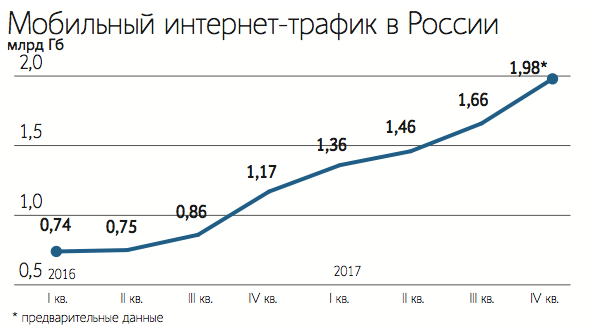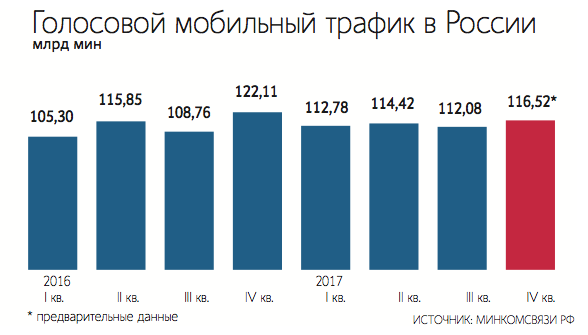Approved amount of traffic storage according to the law of Spring
The Government of the Russian Federation adopted Resolution No. 445 “On Approval of the Rules for Storage by Telecommunications Operators of Text Messages of Users of Communication Services, Voice Information, Images, Sounds, Video and Other Messages of Users of Communication Services” ( text ), which finally clarified the technical details operators are bound to carry out the notorious package of laws of Yarovaya-Ozerova, that is, how long to store Internet traffic, voice traffic, text messages, etc.
So, here are the main provisions of the Rules:
The document was published on April 19, 2018. Yesterday, the first reviews began to come from industry representatives. For example, Rostelecom announced a shortage in the market of certified equipment “taking into account the scale of infrastructure of Rostelecom,” which makes it difficult to fulfill the requirements of the Rules.


The operator of "MegaFon" called the requirements "compromise" and kept the forecast for the cost of its implementation at the level of 35-40 billion rubles (from $ 573 million to $ 656 million at the current rate). Other large operators will incur comparable costs. Probably, the cost of purchasing equipment will be passed on to subscribers through an increase in tariffs for communication services.
Meanwhile, manufacturers of certified equipment for SORM are counting on a sharp increase in demand from operators .
So, here are the main provisions of the Rules:
- The operator must keep traffic in Russia.
- By agreement with the FSB, it is allowed to store traffic on “technical means of accumulating information” belonging to another telecom operator.
- "Technical means of accumulating information" are included in the equipment that includes the SORM system.
- Telephone operators and data services for the purpose of transmitting voice information store voice traffic and text messages in full for 6 months .
- Internet providers since July 1, 2018 store traffic in zero volume, and from October 1, 2018 - in full. The capacity of the storage system must be equal to the volume of traffic transmitted within 30 days preceding the date of commissioning of technical means of information accumulation.
')
Note: the Rules do not explicitly specify the period during which traffic should be stored. Based on the text of the regulatory act, the Internet provider must:- Calculate how much traffic he missed in the last month.
- Install drives of the appropriate size.
- Save all user traffic for the entire period while there is enough capacity of installed drives.
- The operator is obliged to annually increase the storage system capacity by 15% within five years from the date of putting the accumulation equipment into operation.
Note: hence the obvious life hack. If an Internet provider for 30 days significantly reduces the amount of traffic in its network (for example, blocks YouTube and torrents for 30 days), then the next five years can significantly save on the cost of hardware accumulation (if during these 30 days it does not lose all customers). Relatively speaking, if the volume of traffic for these 30 days has decreased by 100 times, then the next 5 years of installed data storage will only be enough to store 1% of the monthly traffic of users, that is, all the traffic in about the last 8 hours. Accordingly, the operator costs for the purchase of equipment and hosting are reduced by an order of magnitude. Apparently, this effectively levels the requirement of spying on users, moreover, in compliance with the law. True, there is one nuance (see the next paragraph).
UPD. Note 2: It was rightly noted in the comments that instead of storing encrypted traffic (HTTPS), it is possible, at the request of the FSB, to generate randomly generated data that does not differ in essence from the encrypted traffic. This is another “lifepack” that allows you to save on the volume of the storage system. - The date of entry of technical means of accumulating information into operation is the date of signing by the representatives of the authorized body of the FSB, Roskomnadzor and the operator of the act of commissioning technical means in accordance with paragraph 10 of the Rules for Interaction of Communication Operators with Authorized State Bodies Conducting Operational-Investigation Activities.
Note : in other words, if a telecom operator decides on such a “life hack” to protect its users from surveillance, it risks that the FSB and Roskomnadzor simply do not sign the act of putting the system into operation with an underestimated storage volume. This suggests an obvious bypass of this restriction through the creation of a new legal entity — an operator who will have minimal amounts of traffic at the beginning of work, which does not arouse suspicion among the controlling authorities, and after signing the act of commissioning the tracking system, transfer the entire subscriber base to this legal entity. - Information is deleted from storage devices automatically in accordance with the algorithms provided by the software and the requirements for the information accumulation means used, based on the maximum storage period for traffic within 6 months.
The document was published on April 19, 2018. Yesterday, the first reviews began to come from industry representatives. For example, Rostelecom announced a shortage in the market of certified equipment “taking into account the scale of infrastructure of Rostelecom,” which makes it difficult to fulfill the requirements of the Rules.


The operator of "MegaFon" called the requirements "compromise" and kept the forecast for the cost of its implementation at the level of 35-40 billion rubles (from $ 573 million to $ 656 million at the current rate). Other large operators will incur comparable costs. Probably, the cost of purchasing equipment will be passed on to subscribers through an increase in tariffs for communication services.
Meanwhile, manufacturers of certified equipment for SORM are counting on a sharp increase in demand from operators .
Source: https://habr.com/ru/post/358010/
All Articles